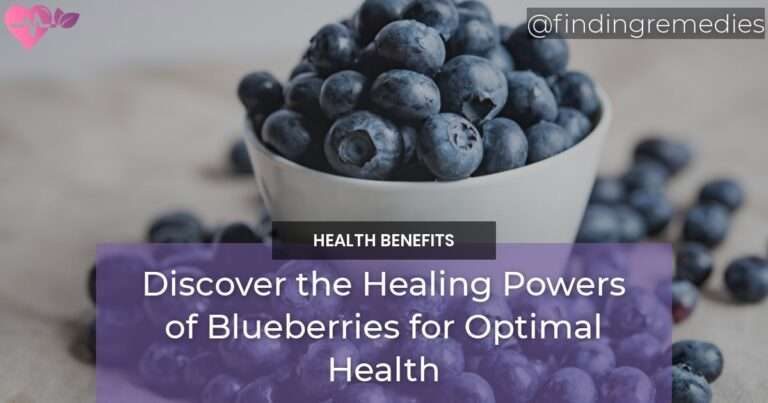Blueberries are small, round, and sweet berries that are commonly enjoyed as a snack or in various dishes. However, did you know that blueberries are also a superfood with numerous health benefits? In this article, we will explore the extensive nutritional profile, natural compounds, and health benefits of blueberries.
Table of Contents
Blueberries’ Nutrition Profile
Overview of Blueberries Nutritional Content
Blueberries are a nutrient-dense fruit packed with vitamins, minerals, and antioxidants. A 1-cup serving of blueberries (148 grams) contains:
- Calories: 84
- Carbohydrates: 21 grams
- Fiber: 4 grams
- Protein: 1 gram
- Fat: 0.5 grams
- Vitamin C: 24% of the Daily Value (DV)
- Vitamin K: 36% of the DV
- Manganese: 25% of the DV
- Potassium: 6% of the DV
Macronutrients in Blueberries
Blueberries are low in calories and high in fiber, making them an excellent addition to a balanced diet. Additionally, blueberries have a low glycemic index, which means they won’t cause a significant spike in blood sugar levels.
Micronutrients in Blueberries
Blueberries are rich in micronutrients such as vitamin C, vitamin K, manganese, and potassium, which play essential roles in body functions like immune support, blood clotting, bone health, and nerve impulses.
Natural Compounds in Blueberries
Overview of Blueberries’ Natural Compounds
Blueberries contain several natural compounds that contribute to their health benefits. The most noteworthy compounds include:
- Anthocyanins: The pigment that gives blueberries their blue color.
- Polyphenols: Antioxidant compounds that protect cells from damage and inflammation.
- Flavonoids: A class of polyphenols that play a role in cardiovascular health, brain function, and cancer prevention.
Anthocyanins and its Benefits
Anthocyanins are a type of flavonoid that has potent antioxidant and anti-inflammatory properties. Studies have shown that anthocyanins may improve brain function, prevent cognitive decline, and reduce the risk of heart disease.
Flavonoids and its Benefits
Flavonoids are a type of polyphenol that have potent antioxidant properties. Studies have shown that consuming flavonoids can improve cardiovascular health, reduce inflammation, and protect against cancer.
Polyphenols and its Benefits
Polyphenols are a group of compounds found in plants that have antioxidant properties. Blueberries are rich in polyphenols, which can help protect against chronic diseases such as cancer, diabetes, and heart disease.
Health Benefits of Blueberries
Blueberries and Memory Improvement
Several studies have linked blueberry consumption to improved brain function and memory. The natural compounds in blueberries, such as anthocyanins and flavonoids, have been shown to improve cognitive function, increase blood flow to the brain, and reduce oxidative stress.
Blueberries and Functional Mobility
The natural compounds in blueberries have been linked to improved functional mobility, especially in older adults. Studies have shown that consuming blueberries can improve muscle function, balance, and reduce the risk of falls.
Blueberries and Blood Pressure Improvement
Blueberries contain compounds that have been shown to improve blood pressure levels. Studies have shown that consuming blueberries regularly can help reduce blood pressure and improve overall cardiovascular health.
Blueberries and Colon Cancer Reduction
Studies have linked blueberry consumption to a reduced risk of colon cancer. The natural compounds in blueberries, such as polyphenols and flavonoids, have been shown to have anti-cancer properties that help prevent the growth and spread of cancer cells.
Effects of Cooking and Storage on Blueberries
Cooking Methods that Preserve Blueberries’ Nutritional Value
Cooking and processing can cause a loss of nutrients in blueberries. However, some cooking methods, such as steaming and baking, can help preserve the nutritional value of blueberries.
The Impact of Processing and Preservation Techniques on Blueberries
Processing and preservation techniques can also impact the nutritional value of blueberries. Freezing and drying blueberries can help preserve their nutritional content, while canning can cause a loss of nutrients.
Proper Storage of Blueberries
To maximize the shelf life and nutritional value of blueberries, it’s essential to store them properly. Blueberries should be stored in a cool, dry place and consumed within a few days of purchase.
Varieties and Types of Blueberries
Overview of Blueberry Varieties
There are several different varieties of blueberries, including highbush, lowbush, and rabbiteye. Each variety has unique characteristics in terms of taste, size, and nutritional content.
Differences between Wild and Cultivated Blueberries
Wild blueberries are smaller and have a more intense flavor than cultivated blueberries. However, both wild and cultivated blueberries have similar nutritional profiles and health benefits.
Health Benefits of Different Types of Blueberries
Different types of blueberries have varying nutritional profiles and health benefits. For example, rabbiteye blueberries have a higher antioxidant content than highbush blueberries.
Disadvantages and Advantages of Blueberries Consumption
Potential Health Risks of Consuming Blueberries
Although blueberries are generally considered safe for consumption, some individuals may experience allergic reactions. Additionally, consuming excessive amounts of blueberries can lead to digestive issues.
The Benefits of Blueberry Supplementation
Blueberry supplementation has been shown to have several health benefits, including improved cardiovascular health, cognitive function, and glucose metabolism.
Incorporating Blueberries into a Balanced Diet
Blueberries are a versatile fruit that can be enjoyed in a variety of ways. They can be added to smoothies, oatmeal, salads, or eaten as a snack. Including blueberries in a balanced diet can help provide essential nutrients and antioxidants.
In conclusion, blueberries are a delicious and nutritious fruit that offers numerous health benefits. The natural compounds in blueberries, such as anthocyanins, polyphenols, and flavonoids, have anti-inflammatory, antioxidant, and anti-cancer properties that help protect against chronic diseases. By incorporating blueberries into a balanced diet, you can reap the health benefits of this superfood.
Resources
- 1. “Blueberries: A review of their health benefits and potential contributions to dietary intake” by A. Cassidy, S. Mukamal, and E. Liu.
- 2. “Blueberries and their anthocyanin and procyanidin fractions reduce the growth of colon cancer cells” by J.B. Mertens-Talcott, J.T. Percival, and N.R. Talcott.
- 3. “Blueberry supplementation improves memory in older adults” by R.K. Whyte, M.C. Williams, and C.M. Buckley.

